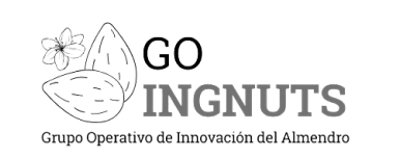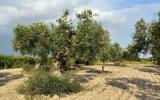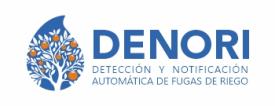
INGNUTS Operational Group: Sustainable almond cultivation through precision agriculture, improving soil health and biodiversity in Andalusia, Castilla-La Mancha, and Extremadura.
- Type Operational group
- Status In progress
- Execution 2024 -2027
- Assigned Budget 470.675,78 €
- Scope Supraautonómico
- Autonomous community Andalucía; Castilla - La Mancha; Extremadura
- Main source of financing CAP 2023-2027
- Project website GO INGNUT
The project aims to significantly increase the economic performance of almond farms through digitalisation and the introduction of new production technologies in a sustainable way, reducing their carbon, nitrogen and water footprints, while improving soil health and biodiversity.
Technology will allow for better design of the plot's hydraulic and energy infrastructure by enabling farmers to learn how to use and implement this technology. This will allow them to appropriately utilize the possibilities of monitoring plots based on irrigation and fertilization, and thus make the right operating decisions with them. To properly reap the benefits of a healthy environment, there is a need to transfer technologies related to vegetation cover, soil health, and the promotion of biodiversity, as well as the economic, social, and environmental impact of the technologies themselves that our activities as farmers produce.
- A1.R1 A2.R1 Hydraulic, energy and agronomic evaluation.
- A3.R1 A4.R1 Initial proposal for hydraulic, energy and agronomic improvements.
- A5.R1 Assessment of intra-plot spatial variability.
- A6.R1 Final hydraulic, energy and agronomic proposal.
- A1.R2 A2.R2 Data entry and platform preparation.
- A3.R2 UAV data collection on commercial plots.
- A4.R2 Data collection on the pilot plot.
- A5.R2 A6.R2 Processed satellite and UAV data for commercial plots, and piloted.
- A7.R2 Installation of ground sensors, monitoring and data collection.
- A8.R2 A9.R2 Data collection and analysis of ground sensors.
- A1.R3 A2.R3 Initial planning of irrigation works and pilot hydraulic installation.
- A3.R3 A4.R3 A5.R3 A6.R3 Monitoring and evaluation of pilot and commercial plots.
- A1.R4 Initial planning of fertilization work. A2.R4 Obtaining data from soil, foliar, and water analyses
- A3.R4 A4.R4 Monitoring and evaluation of fertilization in commercial and pilot plots.
- A1.R5 Planning biodiversity and soil work. A2.R5 A3.R5 Establishment of green roofs and hotels.
- A4.R5 Application of compost and biostimulant.
- A5.R5 A6.R5 A7.R5 Monitoring and assessment of biodiversity and soil health.
- A1.R6 A2.R6 A3.R6 A4.R6 Planning and Adaptation of the water, CO2 and N2 footprint model
- A5.R6 Sampling: lateral images, water potential, soil electrical current.
- A6.R6 A7.R6 Calculation of water stress and vegetation indices.
- A8.R6 Generation of soil and plant variability maps.
- A9.R6 A10.R6 A11.R6 Execution of the carbon, nitrogen and water footprint model.
- A12.R6 Evaluation of sustainable management.
Significantly increase the economic performance of almond farms through digitalization and the introduction of new production technologies, in a sustainable manner, and reducing their carbon, nitrogen, and water footprints, while improving soil health and biodiversity.
Other objectives of the project:
- O1: Promote the exploitation of the benefits of precision agriculture and the proper use of its instrumentation, including optical, thermal, and ground-based sensing techniques, and their appropriate treatment through AI.
- O2: Transfer to producers new cultivation techniques related to fertilization, irrigation, and the application of plant cover, as well as soil health care, increased pollination, and biodiversity.
- O3: Promote sustainable farming with a low carbon, water, and nitrogen footprint, improving the environment socially, economically, and environmentally.
- O4: Consolidation of an Almond Innovation Community in Spain, which serves as a benchmark and unifier of innovation and technology transfer, and which addresses social, environmental, and economic needs.
This technology will allow for better design of the plot's hydraulic and energy infrastructure (R1). It will also enable farmers to learn how to use and implement this technology (R2). It will also enable farmers to appropriately utilize the possibilities of monitoring plots based on irrigation (R3) and fertilization (R4) and make the right operating decisions with them. To properly reap the benefits of a healthy environment, there is a need to transfer technologies related to vegetation cover, soil health, and biodiversity promotion (R5), and to identify the economic, social, environmental, and technological impacts produced by our activities as farmers (R6). Furthermore, every project makes sense if it has a clear impact on the lives of people living in rural areas and working in agriculture. Therefore, the dissemination of these results is essential, as is reaching the entire almond sector broadly, and not only this sector but also all citizens living in this environment (R7, Dissemination).
- Coordinator/entity name: Agrarian Association of Young Farmers-Asaja Málaga
- Postal address: Mauricio Moro, 4-3º, Edif. Eurocom Centro 29006 Málaga
- Coordinator/entity email: asajamalaga@asajamalaga.com
- Telephone: 952311111
- Asociación Agraria Jóvenes Agricultores-ASAJA Málaga
- Asociación Agraria Jóvenes Agricultores-ASAJA Málaga
- Asociación Agraria Jóvenes Agricultores-ASAJA Málaga
- SAT Los Tallaos
- Hemav Technology S.L
- Agencia Estatal Centro Superior de Investigaciones Científicas
- Agbar Agriculture, SAU
- Syngenta España SAU






